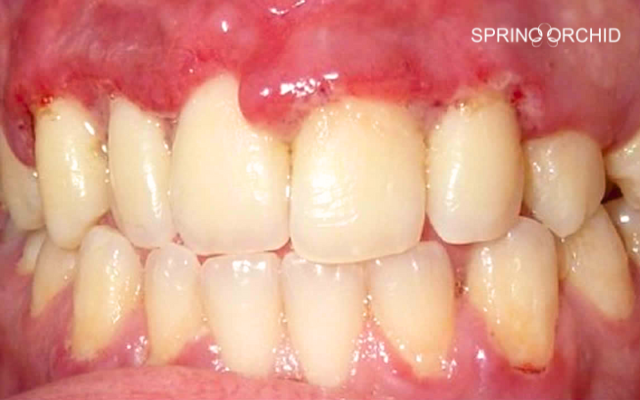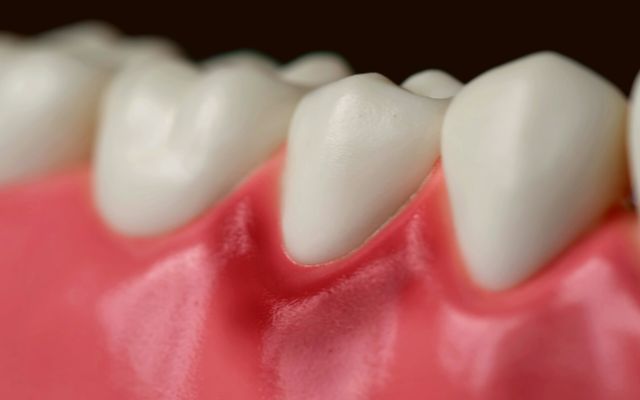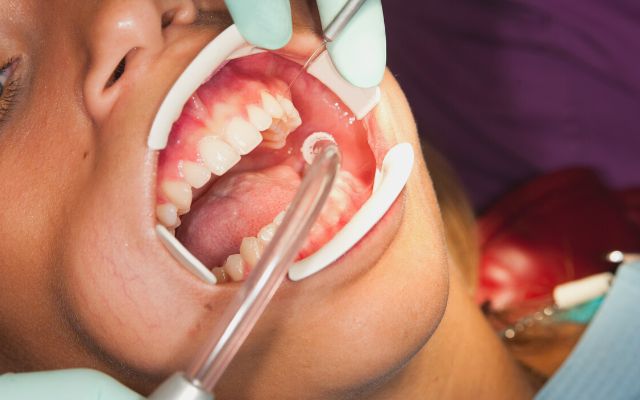Trench mouth is a severe and advanced form of gingivitis, which is the most common gum disease. It can cause gums to bleed, swell, and be painful. To know more about trench mouth including its causes, symptoms, and treatment options. The information you need is provided below in this article. Let’s get started!
Read on to know more about dead teeth and why it’s imperative to get treatment as soon as possible if you suspect you may have one.
What Is Trench Mouth?


A trench mouth is a serious gum infection that results from an accumulation of oral bacteria.
Normally, your mouth contains a healthy balance of bacteria, fungi, and viruses. However, poor oral hygiene can cause harmful microorganisms to grow. Gingivitis is characterized by red, sensitive, and bleeding gums, while trench mouth is a rapidly progressing form of gingivitis.
According to Cleveland Clinic, trench mouth is not contagious. Trench mouth can be traced back to World War I when soldiers often developed severe gum disease due to a lack of dental care during combat. Its official name is Vincent’s stomatitis or acute necrotizing ulcerative gingivitis (ANUG).
If left untreated, trench mouth can cause destruction of gum tissue and spread to nearby areas, such as the cheeks, lips, and jawbones. However, it is not typically fatal.
Causes of Trench Mouth
The trench mouth condition can be caused by a number of factors, including the following:
- Poor oral hygiene: Not brushing and flossing regularly can lead to a buildup of plaque and bacteria, which can cause gum inflammation and infection.
- Smoking: Smoking weakens the immune system, making it easier for bacteria to invade the gums and cause infection.
- Stress: High levels of stress can also weaken the immune system, making the body more susceptible to infection. Stress can also lead to poor oral hygiene habits, which can exacerbate the symptoms of trench mouth.
- Nutritional deficiencies: Vitamin C deficiency can weaken the immune system, making it harder to fight diseases. Poor dental health from a poor diet can raise trench mouth risk.
- Weakened immune system: HIV/AIDS and cancer impair the immune system, making it easier for germs to infect the gums. Gum infections cause most adult tooth loss.
- Trauma to the gums: Trauma to the gums, such as toothbrush discomfort, can allow germs to infect and produce an infection.
It’s worth noting that trench mouth is not infectious, and it cannot spread from person to person. However, the bacteria that lead to trench mouth can exist in saliva. So it’s crucial to follow good oral hygiene practices to avoid the transmission of bacteria.
Symptoms of Trench Mouth


It is essential to be aware of the signs of trench mouth in order to receive treatment in a timely manner, which will help you avoid complications. Although the symptoms of trench mouth are comparable to those of gingivitis, the progression of the condition is typically quicker.
The following are some of the common symptoms of trench mouth:
- Painful, bleeding gums
- Bad breath
- Ulcers
- Metallic taste
- Swollen gums
- Difficulty swallowing
- Swelling in the face
- Fatigue
- Fever
- Others such as headaches
Trench Mouth Diagnosis
Trench mouth is typically diagnosed by a dental professional through a combination of physical examination, dental X-rays, and laboratory tests.
During the dental physical examination, the dentist or periodontist will check for symptoms such as painful and bleeding gums, swelling, and a foul odor coming from the mouth. They may also ask about any recent changes in oral hygiene habits or other symptoms the patient may be experiencing.
Dental X-rays can help detect any bone loss or other structural damage that may have occurred due to the infection.
In some cases, the dental professional may take a gum tissue sample to confirm the presence of specific bacteria associated with the trench mouth.
Seeking the advice of a qualified dental professional is important to obtain a proper diagnosis and determine the appropriate course of treatment for trench mouth or any other oral health concern.
Treatments For Trench Mouth


Trench mouth may seem alarming, but don’t worry – treatment is generally straightforward and comfortable.
Within just a few days of starting treatment, you can begin to feel relief, and within a few weeks, the issue should be completely resolved.
Your dentist will likely prescribe antibiotics to combat the infection and prevent its spread. They will also advise you on proper at-home oral hygiene practices to maintain healthy gums.
The dentist will perform a thorough cleaning to remove plaque and tartar buildup, and they’ll schedule a follow-up appointment to ensure everything is healing properly.
Remember to brush your teeth at least twice a day, floss daily, and use an antibacterial mouthwash to prevent the recurrence of the infection.
Prevention
Prevention of trench mouth involves several key strategies, including maintaining good oral hygiene, adopting a healthy diet, and scheduling regular dental check-ups.
- Good oral hygiene: This is critical in preventing trench mouth. It includes brushing at least twice a day and flossing daily to remove plaque and bacteria. Using an antiseptic mouthwash can also help to kill bacteria and freshen your breath.
- A healthy diet: This can also play a role in preventing trench mouth. Eating a well-balanced diet rich in fruits, vegetables, and lean protein can help to strengthen the immune system and promote healthy gums.
- Regular dental check-ups: This is important in preventing trench mouth and other oral health issues. During these appointments, a dentist can perform a thorough cleaning to remove plaque and tartar buildup and check for signs of gum disease or other problems.
- Avoiding tobacco and excessive alcohol consumption
It is important and can also help to prevent trench mouth, as both can weaken the immune system and contribute to the development of gum disease.
By adopting these preventive measures and following good oral hygiene practices, individuals can greatly reduce their risk of developing trench mouth and other oral health problems.
Conclusion
In summary, trench mouth is a significant gum infection that can lead to various unpleasant symptoms. Nevertheless, with the right diagnosis and treatment, it can be efficiently controlled and avoided.
Proper oral hygiene, a nutritious diet, and routine dental check-ups are all effective measures to prevent trench mouth.
If you are experiencing any symptoms related to trench mouth or other oral health concerns, it is essential to consult with a professional dental practitioner.
At Spring Orchid Dental, our team of skilled dental experts is committed to providing exceptional care and assisting patients in achieving optimal oral health.
Contact us today to schedule an appointment and learn more about how we can help you maintain a healthy and beautiful smile.
FAQs
Does the trench mouth disappear?
No, the trench mouth must be treated. It will not disappear on its own. Despite the fact that trench mouth is ordinarily curable, there are situations when treatment is ineffective. Common causes of therapeutic ineffectiveness include:
- Your treatment failed to eliminate the infection’s underlying cause.
- After treatment, there is still some dead or diseased tissue behind.
- You have underlying medical conditions that make treatment of trench mouth challenging.
- You did not adhere to the provider’s recommendations on dental hygiene and general health.
How should I care for myself following trench mouth treatment?
Following proper hygiene suggestions, like flossing daily and brushing after meals, is the most critical step. When your immune system is stressed, trench mouth might develop. You can support your immune system with a good diet, sufficient sleep, and stress management.
Is trench mouth a prevalent ailment?
Trench mouth affects somewhere between 0.5% and 11% of the population. It typically affects adolescents and young adults. Trench mouth is more prevalent in regions where dental treatment is unavailable.
People with immune system disorders, including human immunodeficiency virus (HIV), are at a greater risk for trench mouth.
Can you die from trench mouth?
While trench mouth can be quite painful and unpleasant, it is typically not life-threatening if it is properly diagnosed and treated in a timely manner. However, in rare cases where the infection spreads to other parts of the body, there is a small risk of more serious complications.
How long does trench mouth last?
Trench mouth can last for several weeks if left untreated. However, with prompt and appropriate treatment, symptoms should start to improve within a few days and the infection should clear up within a matter of weeks.





